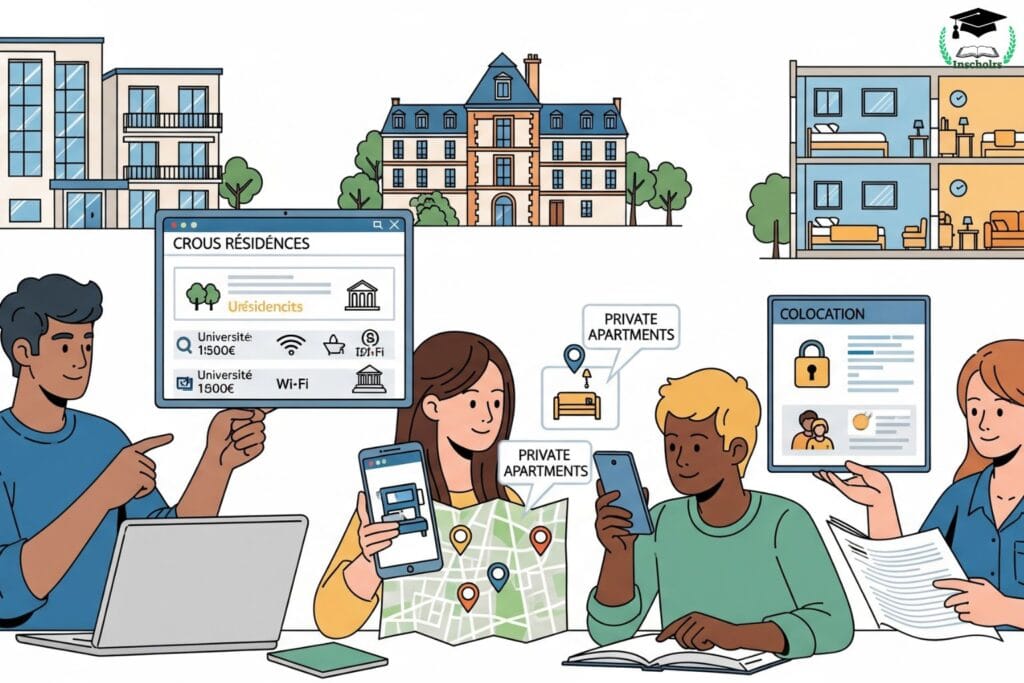
Finding the right accommodation is one of the most important steps for international students planning to study in France. From budget-friendly options to convenient locations, knowing how to search and secure housing can make your student life comfortable and enjoyable. Here’s a complete guide on how to find student accommodation in France.
1. Know Your Accommodation Options
France offers a variety of student housing options. Choosing the right one depends on your budget, location preference, and lifestyle.
a) University Residences (CROUS)
CROUS is the French government student housing system that provides affordable rooms and apartments near universities. Benefits include:
- Low rent (starting from €200–€500 per month)
- Close proximity to campus
- Access to university facilities
b) Private Student Residences
These are modern apartment complexes designed for students, often offering:
- Fully furnished rooms or studios
- Wi-Fi and utilities included
- Security and communal spaces
Private residences are usually more expensive than CROUS but more flexible in terms of contracts.
c) Shared Apartments (Colocation)
Sharing an apartment with other students (colocation) is a popular choice:
- Affordable rent
- Opportunity to meet new people
- Flexible rental terms
You can find colocation listings on websites like Appartager.com or social media groups.
d) Renting a Private Apartment
Some students prefer renting independently. This gives more freedom but requires:
- Higher budget (€500–€1,200/month depending on the city)
- Signing a lease contract
- Paying a security deposit
2. Start Your Search Early
Student accommodation in France is competitive, especially in cities like Paris, Lyon, and Marseille. Start searching at least 2–3 months before your arrival.
3. Use Trusted Platforms and Resources
Here are some reliable ways to find student housing in France:
- CROUS official website – For government-subsidized student residences.
- Le Bon Coin (www.leboncoin.fr) – Popular for private apartments and rooms.
- Appartager.com – For shared apartments (colocation).
- University housing office – Many universities maintain lists of recommended landlords or nearby student residences.
- Facebook groups – Look for city-specific student housing groups.
4. Check the Location and Amenities
Before finalizing your accommodation, consider:
- Distance to your university (public transport availability)
- Safety of the neighborhood
- Utilities included (electricity, water, internet)
- Proximity to grocery stores, banks, and other daily needs
5. Understand the Rental Process
When renting in France, you’ll need:
- Passport or ID
- Proof of enrollment at a university
- Proof of income or guarantor (sometimes required)
- Security deposit (usually 1 month’s rent)
- Signed rental contract (bail)
Many landlords also require French-speaking guarantors, but there are services that help international students with this requirement.
6. Budget for Student Housing
- CROUS residence: €200–€500/month
- Private residence: €400–€800/month
- Shared apartment: €300–€600/month per person
- Private apartment: €500–€1,200/month
Conclusion
Finding student accommodation in France requires research, planning, and early action. Whether you choose a CROUS residence, private apartment, or shared housing, understanding your options and budget will help you secure a comfortable place to live. Using trusted platforms, university resources, and planning ahead ensures a smooth transition into your new life as an international student in France.
Also read
Also Read: